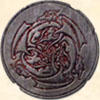Song Mage
The school of song relies on the wizard’s skill at weaving melody, lyrics, and rhythm to create enchantments of great power. Elves and Bards have tapped into this source of magic for centuries, but now more wizards are investigating the intriguing possibilities of this school. While a song mage does not strictly require proficiency in singing or musical instruments, most song mages are also virtuoso vocalists — the subtleties of pitch and expression are critically important in casting a spell in this fashion.
The song mage commands a variety of useful spells that are effective both in attack and defense. While he has few spells that can directly damage an enemy, he is very good at influencing or hindering opponents with his magic, especially at higher levels.
Allowed Races: Humans, Half Elves and Elves can be Song Mages. Dwarven chanting spells are done by priests.
Ability Requirements: Song mages require a Knowledge of 14, reflecting their musical studies, and an Appearance of 15.
Saving Throw Modifiers: All opponents modify their saving throws by -1 when attempting to save against an Song spell cast by a Song Mage. A Song Mage adds a +1 bonus when saving against Song spells.
Bonus Spells and Acquired Powers: The normal saving throw modifiers apply, but note that the Song Mage may apply their saving throw? bonus to magical song or sound attacks such as a sphinx’s roar or banshee’s wail in addition to song spells. At 8th level, song mages gain the ability to enhance the effectiveness of any musical or sound based magical item by 50%; a song mage wielding drums of panic increases the area of affect from 120 foot radius to a radius of 180 feet. If the magical item proves to be cursed, its effect is lessened by 50% (if possible). At 11th level, the song mage gains the ability to counter magical song or sound attacks once per day, negating the effects of the attack in a 10 foot radius centered on the mage. This allows the song mage to protect those nearby from a harpy’s song, a sphinx’s roar, or a shout spell. The mage must stand still or walk slowly and sing for at least one full round to negate the effect, and may continue singing for up to one full turn per level to defeat pervasive or persistent attacks.
All spells in the school of Song are considered to have neither somatic nor material components when cast by a song mage. While song mages are extremely vulnerable to a silence spell, they are also capable of casting spells while securely bound or stripped of all their possessions.
Oppositional Schools: The school of song is opposed by the schools of Necromancy, Divination, and Invocation/Evocation.
